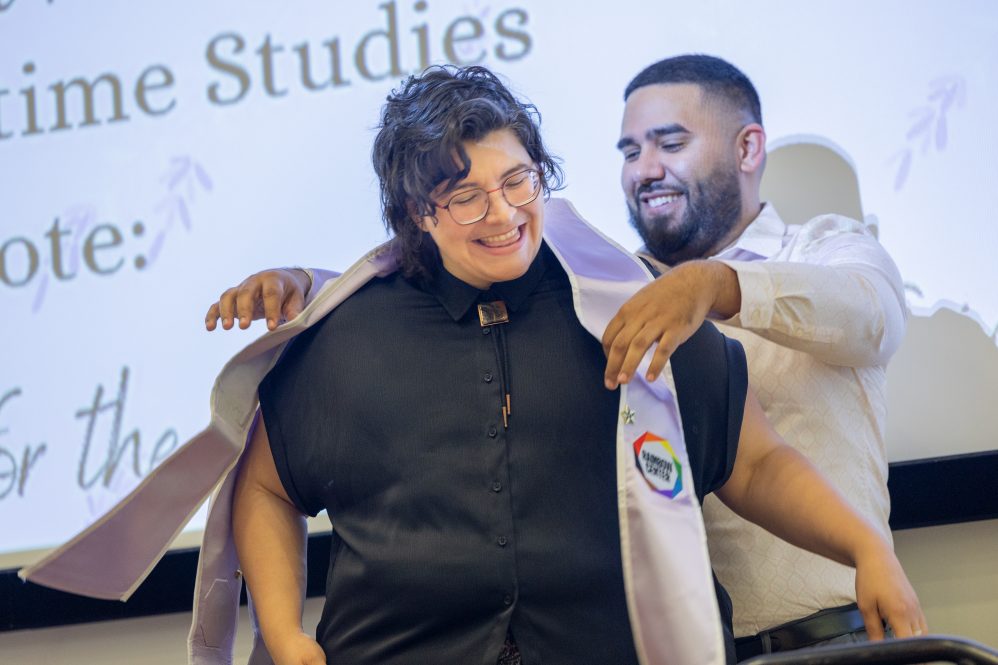Kallan Doyon ’23 (CLAS) said that without the support of the Rainbow Center over the last four years, she still may not have come out to her family and likely wouldn’t have had her parents and grandparents in the audience to witness her Lavender Graduation.
“It really helped me find who I am and become more confident,” Doyon said Friday of the LGBTQ+ resource center.

It’s a place where Makayla Dawkins ’23 (CLAS) said she found most, if not all, of her UConn friends and where she developed a desire to fight for social justice, like reviving the gender-affirming closet that offers clothing for those who can’t or aren’t comfortable shopping in retail stores.
With 30 students participating in Friday’s Lavender Graduation ceremony, there were an equal number of stories illustrating the graduates’ hope for the future and fondness for the community they’ll leave behind on the fourth floor of the Student Union.
“I feel very seen here,” Cameron Deslaurier ’23 (CAHNR) said. “I don’t have to explain my identity.”
That’s also one of the best things about Lavender Graduation, he said: “It’s an opportunity to have the graduation experience without being worried about the sexual identity stuff. Here, you can embrace that. It’s freeing.”
And on Friday, there was no judgment, only celebratory hoots and hollers from friends and family as graduates walked the stage in the Student Union Ballroom to be fitted with lavender stoles that are intended to be worn at Commencement ceremonies in May.
Kelsey O’Neil, Rainbow Center director, said Lavender Graduation started at the University of Michigan in 1995 and since then has become an annual event, generally in April, at many other institutions nationwide to recognize members of the LGBTQ+ communities.
Its founder, Ronni Sanlo, headed the former Lesbian and Gay Men’s Office at the University of Michigan, according to the Human Rights Campaign, and was encouraged to hold the first Lavender Graduation after she was denied attendance at her biological children’s graduations because of her sexual orientation.
By 2001, the HRC website says, Lavender Graduation had spread to more than 45 colleges and universities, beginning at UConn in 2008, and lavender was chosen because of the pink triangle gay men wore in concentration camps and black triangle lesbians wore as political prisoners in Nazi Germany.
“It’s about recognizing the graduates who have come so far in a traditional educational setting that wasn’t meant for them,” O’Neil said of the event that honors “their stories, hard work, and resiliency” in making it to graduation day.
“Those of us who are degree holders fall into the assumption that all go to college,” Michael Vidal, director of diversity and inclusion initiatives in UConn’s Office for Diversity and Inclusion, told the graduates in his keynote speech.
When accounting for things like sexual orientation, disabilities, socio-economic and first-generation status, that’s not always the case, he said.
“If you have not been told yet, or reminded, it is a big deal,” Vidal said, reminding them, “Success is presented as a linear, packaged outcome. Don’t believe the hype. People’s resume of failure is often 10 times longer.”
Undergraduate speaker Ash Maldonado ’23 (CLAS) urged their classmates to “remember how hard you fought to be here today” and to “never let fear paralyze you.”
Tarah Jordan ’23 MA said she didn’t begin to explore her identity until college and found friends she could identify with.
“It was liberating to realize I was not broken,” she told her classmates as graduate speaker. “Being queer is something so dynamic and ever-evolving. There’s no one way to act, dress, or be.”
It’s also something that’s intertwined with other identities – whether professional, personal, recreational, or otherwise – putting oneself into various other communities and potentially risky situations, she said.
“We must take steps to protect ourselves and advocate for others,” Jordan said, explaining her mission is to “not just speak for but with my queer colleagues. Think about how you can do this.”
Doyon said she participated in Lavender Graduation because for her the ceremony recognizes the many people who have been or are barred from their own commencement ceremonies, along with those like Sanlo who couldn’t see their loved ones mark a milestone.
“It’s like we’re being planted and over the years we’ve grown. It highlights the end of my experience,” Dawkins said.



